How automation is redefining customer service advantages today
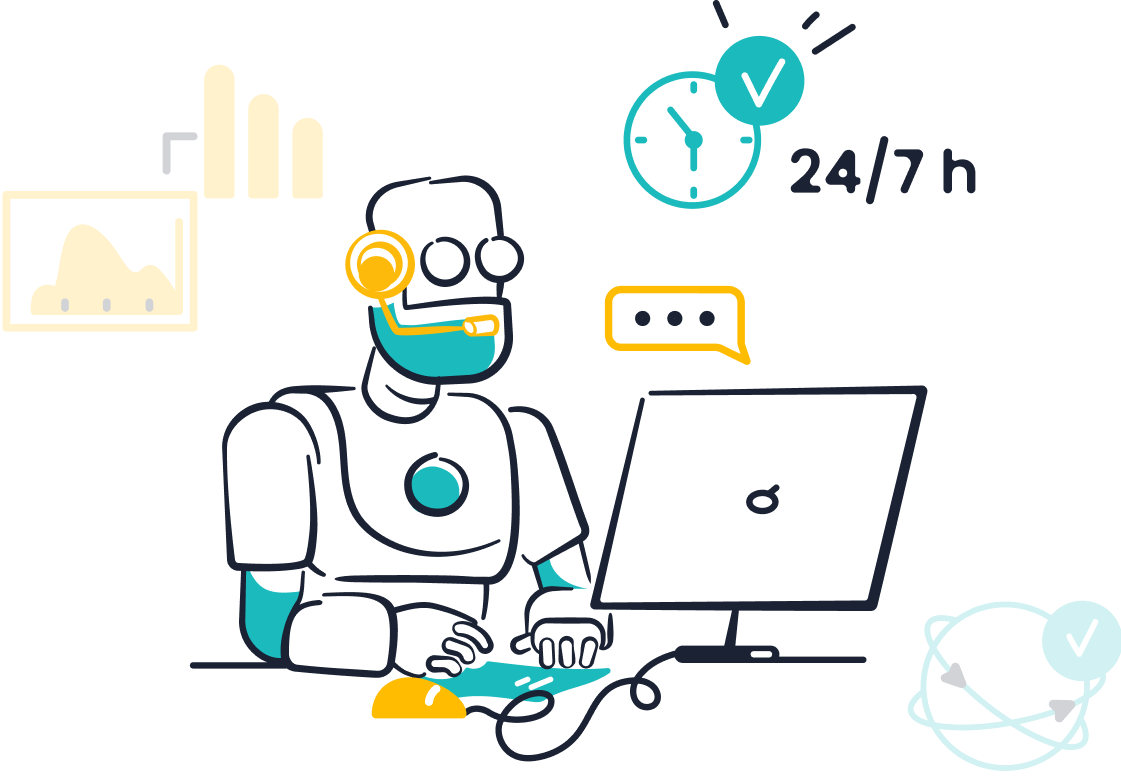
Customer service automation in 2025 moves at a remarkable pace. Nearly half of support teams have adopted AI, and 51% of customers now welcome Generative AI assistants for their interactions. 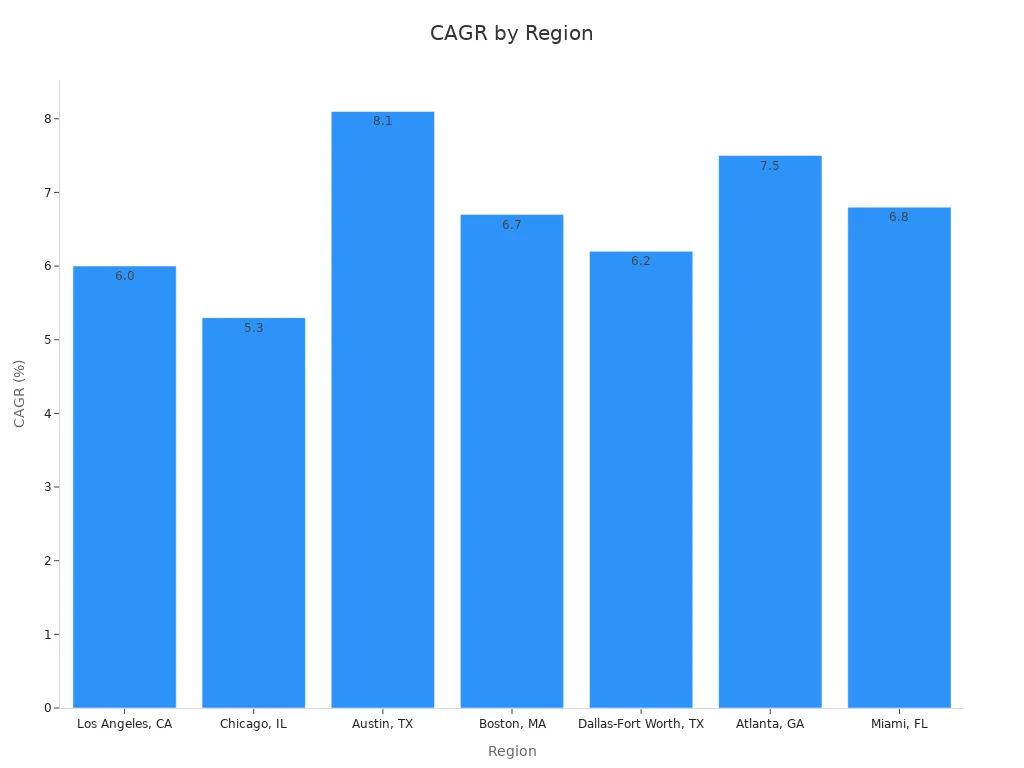 Sobot stands at the forefront, delivering Sobot AI solutions that unlock the advantages of automated customer service for global brands. Companies now rely on these technologies to boost efficiency and elevate every customer touchpoint.
Sobot stands at the forefront, delivering Sobot AI solutions that unlock the advantages of automated customer service for global brands. Companies now rely on these technologies to boost efficiency and elevate every customer touchpoint.
Customer Service Trends 2025
Emerging Customer Service Trends
Customer service trends in 2025 reflect a major shift in how companies interact with their customers. Industry experts highlight proactive support, advanced personalization, and omnichannel experiences as the most important emerging customer service trends. Companies now use data analytics to predict customer needs before they arise. This proactive approach has become a basic expectation rather than a special feature. Omnichannel strategies connect every customer touchpoint, so customers do not have to repeat information. Businesses also focus on data privacy and transparency, building trust with strong security measures.
The following table shows some key statistics shaping customer service trends in 2025:
| Trend | Supporting Data | Source |
|---|---|---|
| Smart self-serve options | 81% of customers try to resolve issues on their own | Harvard Business Review |
| AI-powered tools improve agent efficiency | 79% of agents report faster resolution of complex queries | Zendesk |
| Omnichannel support drives store visits | 80% of store visits are driven by omnichannel strategies | Think with Google |
| Importance of data privacy | 94% of users will not buy if data is not protected | Cisco 2024 Data Privacy Benchmark Study |
| Good service vital for brand loyalty | 97% of customers say good service is essential for loyalty | Forbes |
Note: Companies that invest in privacy see 80% higher loyalty and trust from customers.
Generative AI and Automation
Generative AI and ai-driven automation now play a central role in customer service trends. By 2025, 80% of customer service and support organizations are expected to use generative AI to boost agent productivity and improve customer experience. Gartner predicts that by 2026, 20% to 30% of service agents will be replaced by generative AI. This technology increases productivity in customer care functions by 30-45%, according to McKinsey.
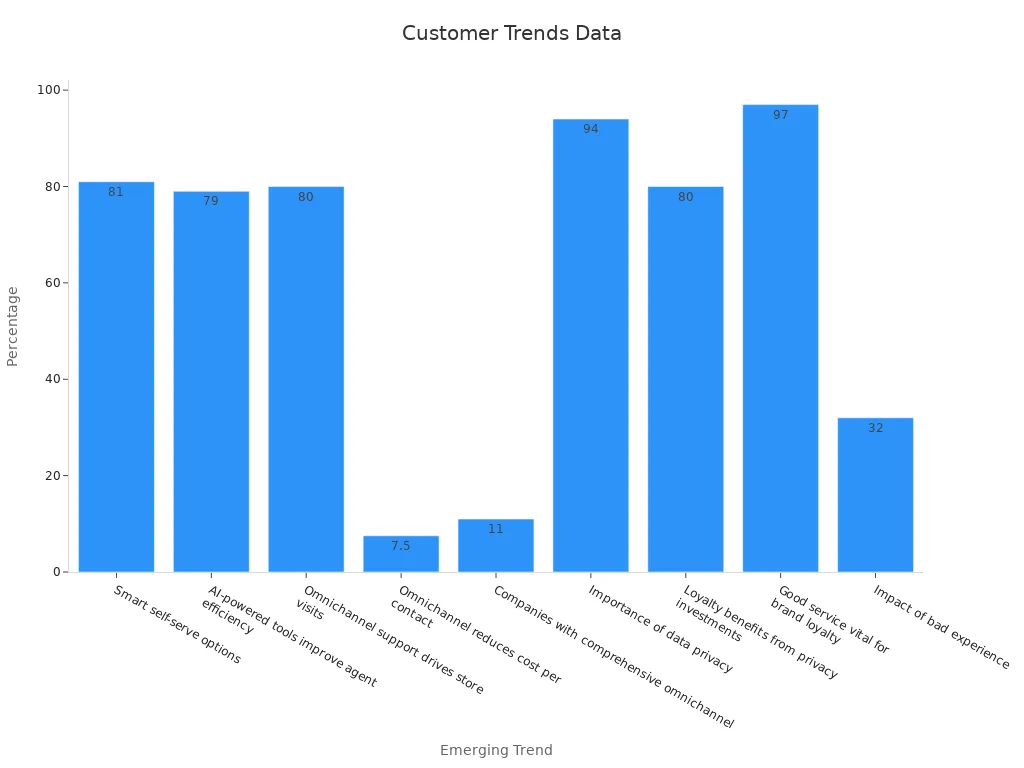
Sobot leads in this area by offering AI-powered chatbots and omnichannel solutions that help businesses deliver fast, personalized, and secure support. These tools allow companies to provide 24/7 service, reduce costs, and meet the rising expectations set by customer service trends. As more organizations adopt these technologies, the balance between AI efficiency and human empathy remains crucial for success.
Advantages of Automated Customer Service

Efficiency and Speed
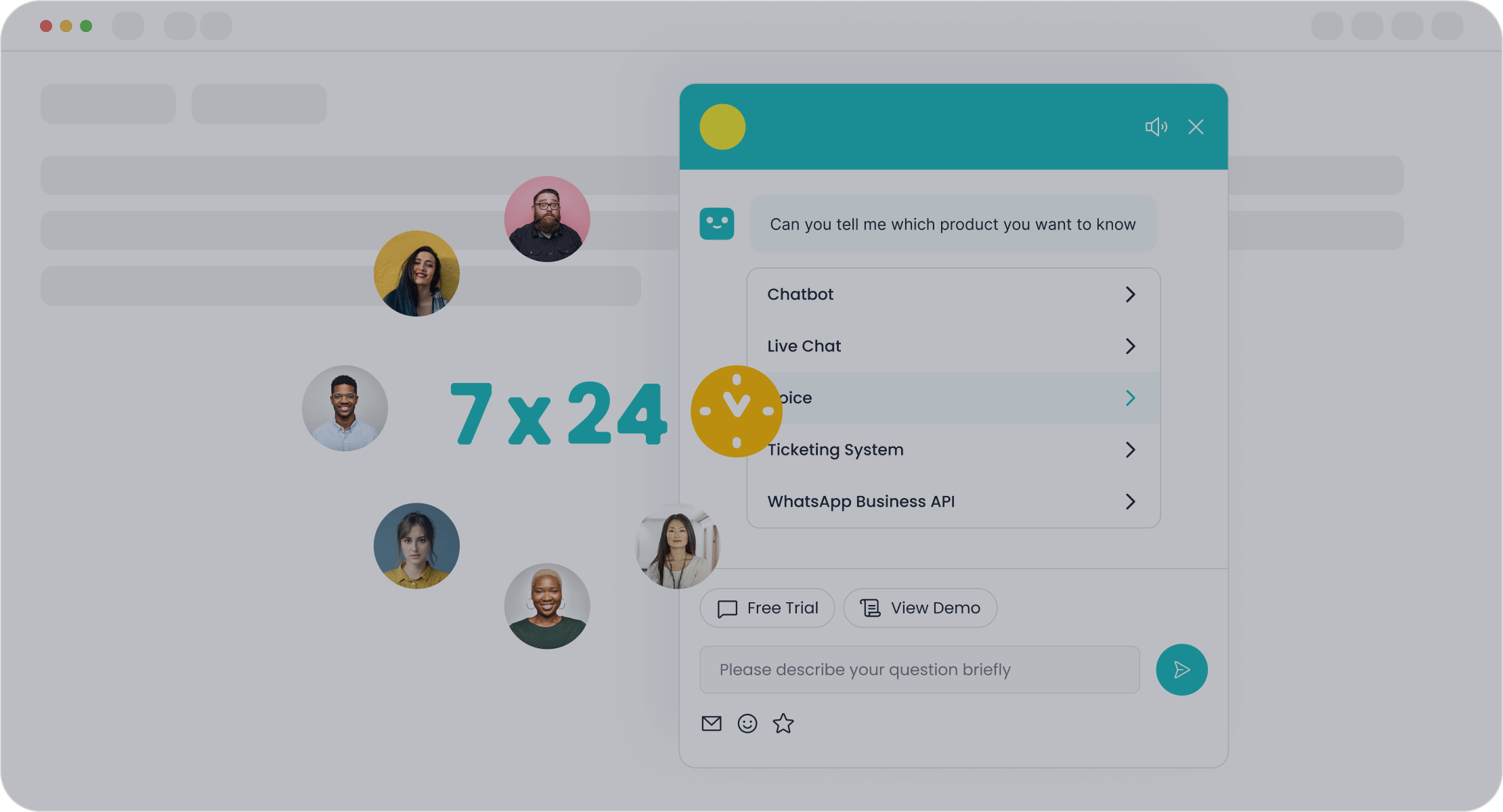
Automated customer service transforms how companies respond to customer needs. Businesses now resolve issues faster and more accurately. Automated systems handle 80-97% of standard support tasks, which means customers get answers almost instantly. Sobot’s AI-powered chatbot, for example, provides 24/7 support and manages routine questions without delay. This approach frees human agents to focus on complex cases.
Key metrics show the impact of automation on efficiency and speed:
- Automated ticket assignment reduces wait times by routing inquiries to the right team.
- Automation of routine tasks and SLA management ensures timely service.
- Live chat analytics track response times in real time, helping teams optimize staffing.
- Instant automated replies give customers immediate help for common questions.
- Performance reports measure resolution times and ticket trends, supporting ongoing improvements.
The following table highlights how automation improves efficiency and customer satisfaction:
| Statistic Description | Value | Source |
|---|---|---|
| Percentage of customer interactions managed without humans | 85% by 2025 | Gartner |
| Increase in customer satisfaction reported by AI users | 25% | Gartner |
| Consumers who say AI enhances their CX | 73% | Capgemini |
| Increase in customer satisfaction from AI-driven interactions | 10-20% | McKinsey |
| Customers expecting proactive suggestions from companies | 50% | Salesforce |
Sobot’s solutions help companies achieve these results by automating ticket routing, providing instant responses, and tracking key metrics. The advantages of automated customer service include faster response times and higher satisfaction rates.
Personalization at Scale
Personalized customer experiences are now possible on a large scale with automation. AI-powered systems use customer data to tailor every interaction. Sobot’s chatbot, for instance, recognizes customer preferences and delivers relevant answers in multiple languages. This level of personalized service was once only possible with dedicated human agents.
Benefits of personalization at scale include:
- Automated services provide fast, consistent, and accurate responses.
- AI tailors interactions using customer data, making each engagement more relevant.
- Chatbots handle up to 80% of routine questions, allowing agents to focus on complex issues.
- 24/7 availability removes barriers and increases convenience.
- Businesses that blend automation with human support see stronger client retention.
Note: Nearly 80% of consumers value speed, convenience, and knowledgeable help, all delivered by AI-powered chatbots.
Sobot’s platform enables companies to deliver personalized customer experiences across channels like WhatsApp, SMS, and live chat. This approach ensures every customer receives the right information at the right time. The advantages of automated customer service extend to building loyalty and trust through consistent, personalized service.
Cost Reduction
Automated customer service delivers significant cost savings for businesses. Companies reduce labor costs, optimize staffing, and minimize errors. Sobot’s AI-driven solutions help organizations cut expenses by triaging queries 24/7, saving up to 50% on additional agent costs.
Some real-world examples of cost reduction include:
- A major retailer reduced seasonal hires by over 50% during peak seasons by using AI-driven self-service.
- AI-powered predictive analytics enable accurate forecasting of call volumes, reducing overtime expenses.
- Automated workflow systems deliver 4x faster customer response times.
- Consistent, data-driven responses from AI reduce human error and retraining costs.
The chart below shows the extent of cost savings achieved through automation:
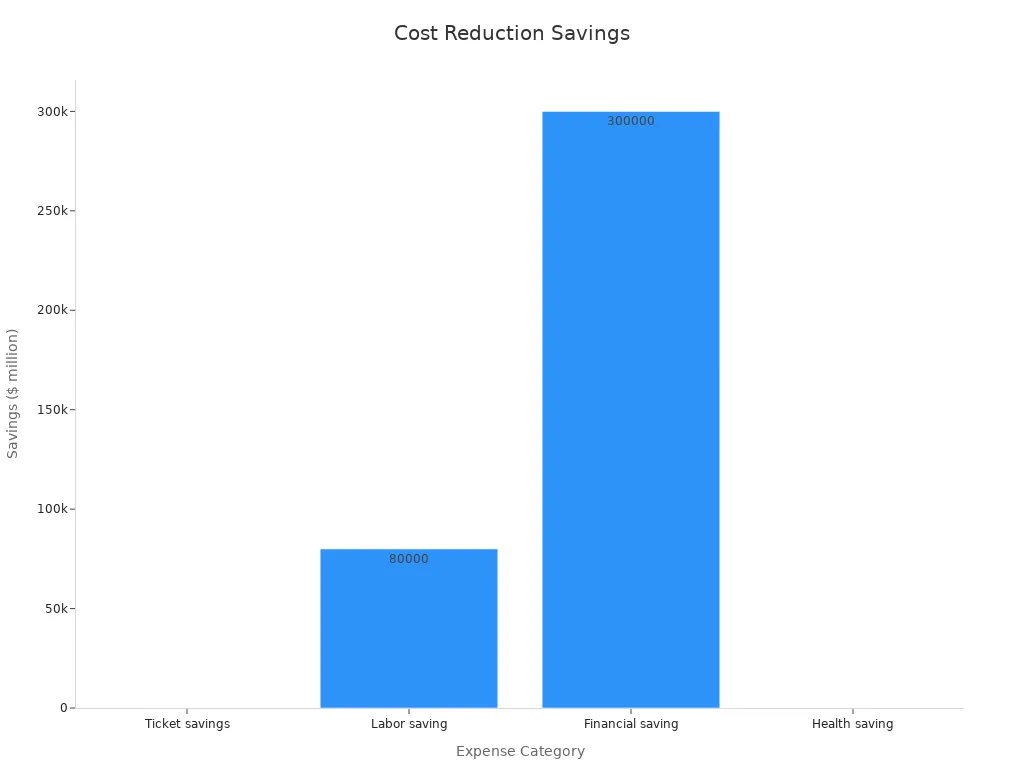
| Statistic Description | Cost Reduction / Savings / ROI | Source / Context |
|---|---|---|
| Reduction in ticket volumes leading to $1.3 million savings | $1.3 million saved by Unity through AI agent deployment | Zendesk blog cited by Plivo |
| Projected agent labor cost reduction by 2026 | $80 billion reduction in contact center labor costs | Gartner forecast |
| AI adoption impact on operations | 35% reduction in customer service operational costs | McKinsey report |
| Customer service cost reduction via chatbots | 30% lower customer service costs | KPMG global report |
| Staffing needs reduction during peak and year-round seasons | Up to 68% peak season, 51% year-round reduction | Gladly blog |
| Faster ticket resolution | 52% faster ticket resolution with AI automation | Gorgias blog |
| Time saved on calls and faster issue resolution | 45% time saved on calls, 44% faster issue resolution | Intercom Customer Service Trends Report 2024 |
| Operational cost reduction | 30% decrease in operational costs | Dialzara blog |
| Labor cost savings | Up to 90% reduction in labor costs | Dialzara blog |
| Cost savings in financial sector | $300 billion reduction in expenditures | Zendesk blog |
| Overall customer service cost reduction | 25% reduction reported by businesses | Xylo.ai blog |
| Return on AI investment | Average $3.50 return per $1 invested | KPMG report via Plivo |
| Time saved by service professionals | Over 2 hours saved daily | Fluent Support blog |
| Cost savings in health insurance | $22 million saved by NIB through AI digital assistants | The Australian news |
Sobot’s chatbot and automation tools help companies realize these savings by reducing manual workloads and improving operational efficiency. The advantages of automated customer service include lower costs, faster service, and improved customer experience.
AI Powered Cloud Contact Centers
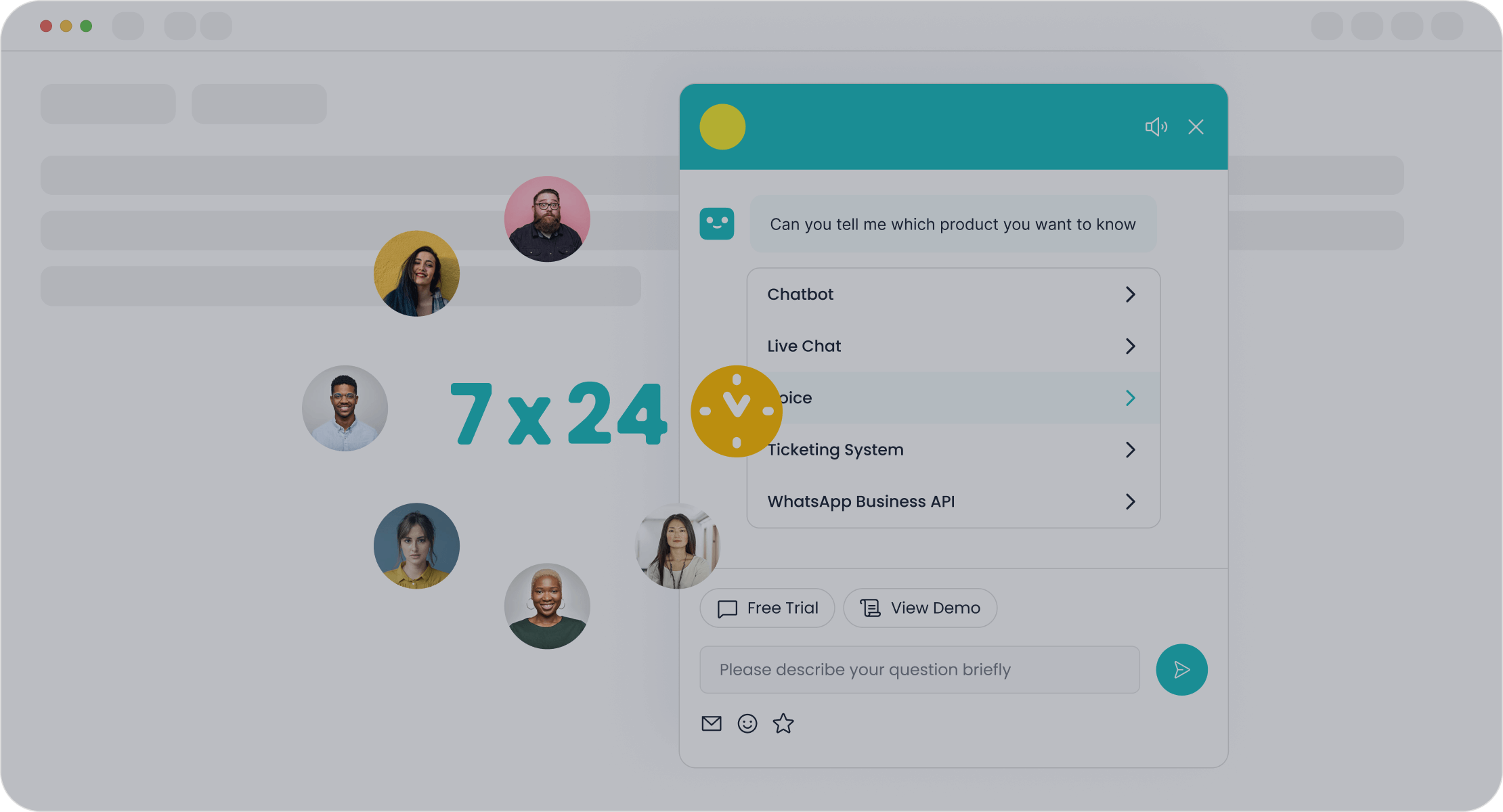
Omnichannel Experiences
AI powered cloud contact centers have transformed how businesses connect with customers. Companies now deliver seamless service across channels like live chat, phone, email, and social media. Omnichannel support allows customers to switch between channels without repeating information. Agents see the full customer history, which helps them respond faster and more accurately.
Key benefits of omnichannel support include:
- Integration of all communication channels into one system.
- Real-time tracking of customer interactions across touchpoints.
- Fast, 24/7 support through AI chatbots and automation.
- Consistent service quality, no matter the channel.
- Reduced wait times and quicker resolutions.
When businesses use omnichannel support, they see faster response times and higher customer satisfaction. Automation tools provide instant replies, while live chat and messaging platforms help agents manage queries efficiently. Companies also measure average first response time to improve speed and quality.
Customers expect smooth transitions between channels. Omnichannel support ensures they never have to repeat themselves, leading to better experiences and loyalty.
Sobot Chatbot Integration
Sobot offers all-in-one contact center solutions that include advanced chatbot integration. The Sobot chatbot can handle up to 80% of customer inquiries on its own. This AI integration reduces resolution times by up to 50% and improves first response times by about 37%. Live chat features allow agents to step in when needed, ensuring complex issues get personal attention.
The table below highlights measurable outcomes from adopting AI powered cloud contact centers:
| Benefit Category | Description | Measurable Impact |
|---|---|---|
| Proven ROI | 304% return on investment over three years | 304% ROI over 3 years |
| Improved Customer Satisfaction | Faster routing and AI-assisted conversations | Higher CSAT, increased first-call resolution |
| Increased Agent Productivity | Automation of routine tasks and real-time assistance | Up to 25% reduction in handle time |
| Reduced Operational Costs | Lower staffing needs and optimized scheduling | Significant cost savings |
Sobot’s chatbot also boosts customer satisfaction, with positive feedback rates around 80%. Businesses report a 36% increase in repeat purchases and up to 68% lower staffing costs during peak seasons. Sobot’s AI integration ensures companies deliver efficient, scalable, and personalized service across every channel.
Contact Center Automation
Agent Productivity
Contact center automation transforms agent productivity by streamlining daily workflows and reducing manual tasks. Automated AI agent assist tools can lower average handle time by up to 20%. Agents onboard 50% faster with AI-driven support, which means new team members become productive quickly. Real-time guidance gives agents instant access to relevant information, helping them answer questions more accurately. Automated call summaries cut down after-call work, so agents spend less time on paperwork and more time helping customers.
Contact center automation also integrates with knowledge bases. Agents retrieve up-to-date information in seconds, which improves response quality and speed. Automation of routine tasks boosts agent productivity by about 20%. AI-driven automation frees agents from repetitive work, allowing them to focus on complex customer needs. This shift leads to higher job satisfaction and better service outcomes.
Key performance indicators for contact center automation include:
- Average Handle Time (AHT)
- First Contact Resolution (FCR)
- Service Level
- Time in Queue
- Abandonment Rate
- Occupancy Rate
- Adherence to Schedule
| KPI Name | Description | Automation Impact |
|---|---|---|
| Average Handle Time (AHT) | Measures time per customer interaction. | Automation reduces AHT through better routing and workflow optimization. |
| First Contact Resolution (FCR) | Percentage of issues resolved on first contact. | Automation equips agents with tools for faster, more accurate resolutions. |
| Customer Satisfaction (CSAT) | Surveys customer feelings post-interaction. | Automation streamlines processes, reducing wait times and errors. |
| Customer Feedback Ratings | Direct feedback from customers. | Customer feedback automation enables quick collection and analysis for improvement. |
Hybrid Automation Models
Hybrid automation models blend AI with human expertise to create a balanced approach in contact center automation. Companies using this model report up to a 30% increase in conversion rates and a 15-20% boost in customer satisfaction. AI handles repetitive tasks, while human agents manage complex or sensitive issues. This combination allows teams to deliver personalized service and adapt to regional needs.
Healthcare call centers using hybrid automation have saved about $1.5 million annually by automating routine tasks. Customer feedback automation plays a key role by collecting and analyzing feedback quickly, which helps teams improve service quality. Sobot’s platform supports hybrid models by integrating chatbots, live chat, and customer feedback automation into one seamless system. This approach ensures faster response times, better engagement, and higher customer retention.
Tip: Hybrid automation models help contact centers scale efficiently while maintaining a human touch.
Building Trust and Human Touch
Human-AI Collaboration
Companies today recognize that balancing automation with human interaction is essential for strong customer engagement. Many support leaders expect AI to transform customer support roles in the next five years. However, a significant number of customers still prefer speaking with a human agent. Studies show:
- 78% of support leaders expect AI to change support careers soon.
- 44% of customers prefer human interaction over AI.
- 71% of customers want to interact with a human agent, while 60% of companies believe AI chatbots are more efficient.
- 70% of customers are more likely to do business with companies offering a personal touch.
Sobot’s platform enables seamless collaboration between AI and human agents. AI-powered assistants handle routine questions, while human agents focus on complex issues and empathy. This approach leads to faster resolutions and higher satisfaction. For example, companies using hybrid models report a 25% increase in customer satisfaction and a 15% reduction in support costs. A Salesforce study found that 75% of customers expect companies to understand their needs, highlighting the value of personalized communication.
| Metric | Improvement/Value |
|---|---|
| Reduction in average handling time | 70% reduction |
| Improvement in first-time resolution | 50% improvement |
| Increase in customer self-service interactions | 2x increase |
AI and human agents together create a better customer experience by combining efficiency with empathy.
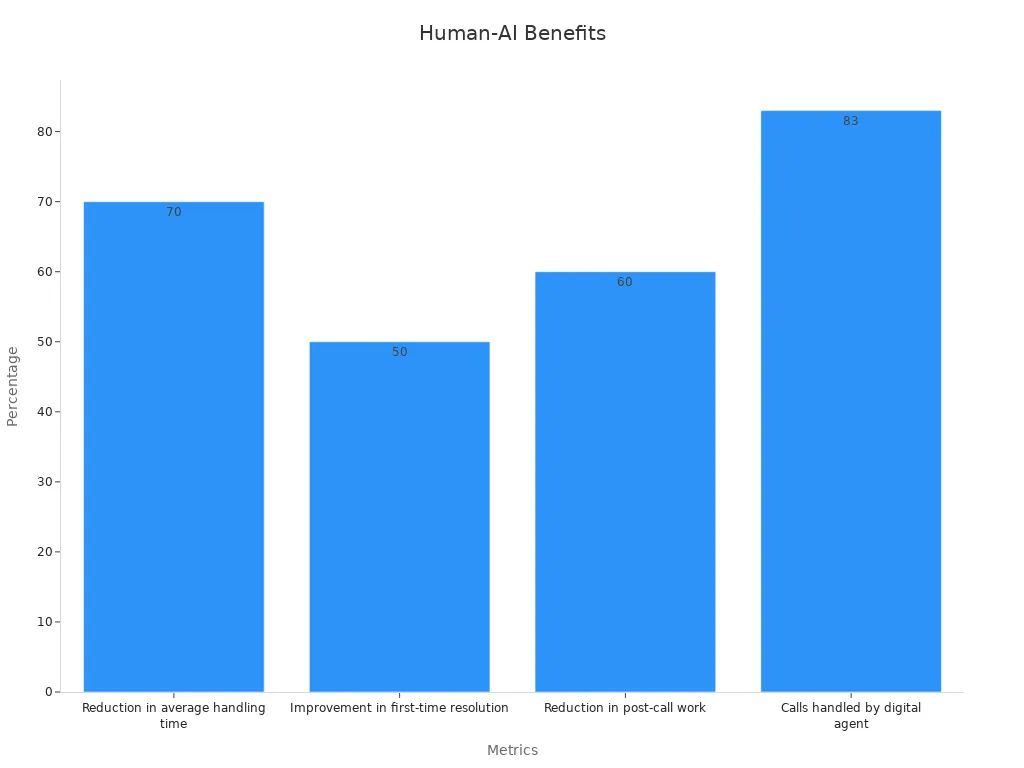
Data Privacy and Compliance
Trust forms the foundation of every customer relationship. Businesses must protect customer data and comply with strict regulations. Recent surveys reveal that 73% of U.S. consumers feel more concerned about data privacy than before. Companies now prioritize zero trust security, with 78% actively working on these initiatives. Non-compliance breaches cost organizations an average of $5.05 million, which is 12.6% higher than general breaches.
| Compliance Benchmark / Data Privacy Aspect | Statistic / Finding | Source / Context |
|---|---|---|
| Zero trust security priority | 78% of companies | Okta State of Zero Trust Security 2021 |
| Multi-framework compliance | Nearly 70% comply with at least six frameworks | Coalfire Compliance Report 2023 |
| Consumer privacy concern increase | 73% of U.S. consumers | SAS Survey |
| Cost impact of non-compliance breaches | $5.05M average cost | IBM Cost of a Data Breach Report 2023 |
Sobot’s solutions support compliance with global standards such as GDPR and offer robust data encryption. The platform helps businesses build trust by protecting sensitive information and responding quickly to any incidents. Customers trust companies that request only relevant data and act fast during breaches. By prioritizing privacy and compliance, organizations strengthen customer loyalty and ensure long-term success.
Real-World Success: Sobot and OPPO
Case Study Overview
OPPO, a global leader in smart devices, faced a surge in customer inquiries during peak shopping seasons. The company needed a solution to manage high volumes of questions while maintaining excellent service. OPPO chose Sobot’s AI-powered contact center and chatbot to automate customer service and streamline operations. Sobot’s platform enabled OPPO to handle repetitive queries efficiently, allowing human agents to focus on complex cases. The integration unified OPPO’s global customer channels and business systems, improving data accessibility and response speed.
Sobot’s customer service automation empowered OPPO to deliver fast, reliable support across multiple channels. The chatbot provided 24/7 assistance in several languages, ensuring customers received accurate answers at any time.
Key Results and Benefits
The partnership between Sobot and OPPO produced measurable improvements in customer satisfaction and operational efficiency. OPPO’s chatbot, powered by Sobot, achieved an 83% resolution rate for customer inquiries. Positive feedback reached 94%, and the repurchase rate increased by 57%. These results highlight the advantages of automated customer service in a real-world setting.
The following table summarizes key metrics from OPPO’s transformation:
| Metric Type | Description | Value / Improvement |
|---|---|---|
| Chatbot Resolution Rate | Customer inquiries resolved by Sobot chatbot | 83% |
| Positive Feedback Rate | Customer satisfaction with automated support | 94% |
| Repurchase Rate | Increase in repeat purchases | 57% |
| Knowledge Base Efficiency | Reduction in maintenance effort | 90% |
| Website Engagement | Increase in session times | +200% |
| Website Bounce Rate | Reduction in bounce rate | -70% |
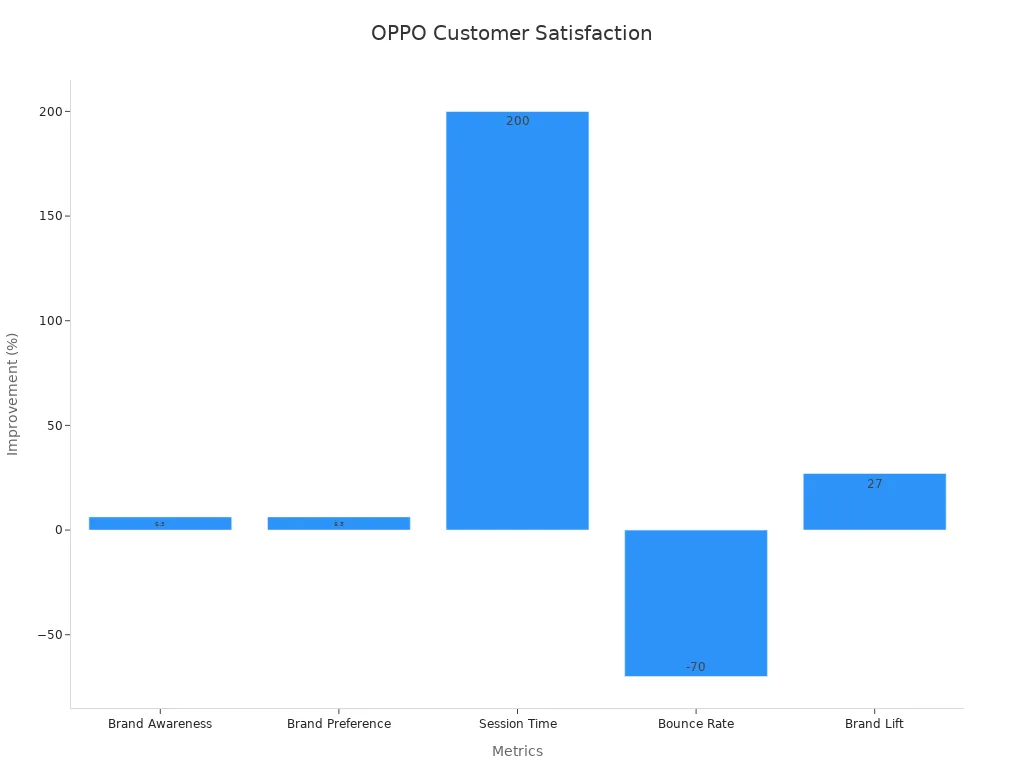
Sobot’s AI-powered contact center solutions helped OPPO boost market share and brand preference. The success story demonstrates how customer service automation can drive higher satisfaction, loyalty, and operational gains for global brands. For more details, visit Sobot’s official OPPO case study.
Implementation Steps
Best Practices
Successful contact center automation starts with a clear plan and proven strategies. Companies should combine chatbots with live agents to balance efficiency and empathy. Recent studies show that 86% of customers prefer human agents for complex issues, so hybrid models work best. Automating order tracking and delivery updates builds loyalty, as 69% of customers are less likely to return after a late delivery. Businesses can reduce manual live chat tickets by 17% within a month of launching automation. Self-service options empower customers and lower ticket volume, especially for common requests like shipping status.
| Best Practice / Insight | Statistic / Evidence | Why It Matters |
|---|---|---|
| Combine chatbots with live agents | 86% prefer human agents (CGS study) | Hybrid support increases satisfaction and trust. |
| Automate order tracking and delivery updates | 69% less likely to shop again after late delivery (Voxware) | Timely updates build loyalty and reduce churn. |
| Reduce manual live chat tickets with automation | 17% decrease in tickets in one month (Jaxxon case) | Automation improves efficiency and agent focus. |
| Automate WISMO inquiries | 16% of tickets are "Where Is My Order" (Gorgias data) | Automation deflects repetitive tickets and frees up staff. |
| Offer self-service order management | Up to 30% of tickets are shipping status requests | Self-service chat empowers customers and reduces workload. |
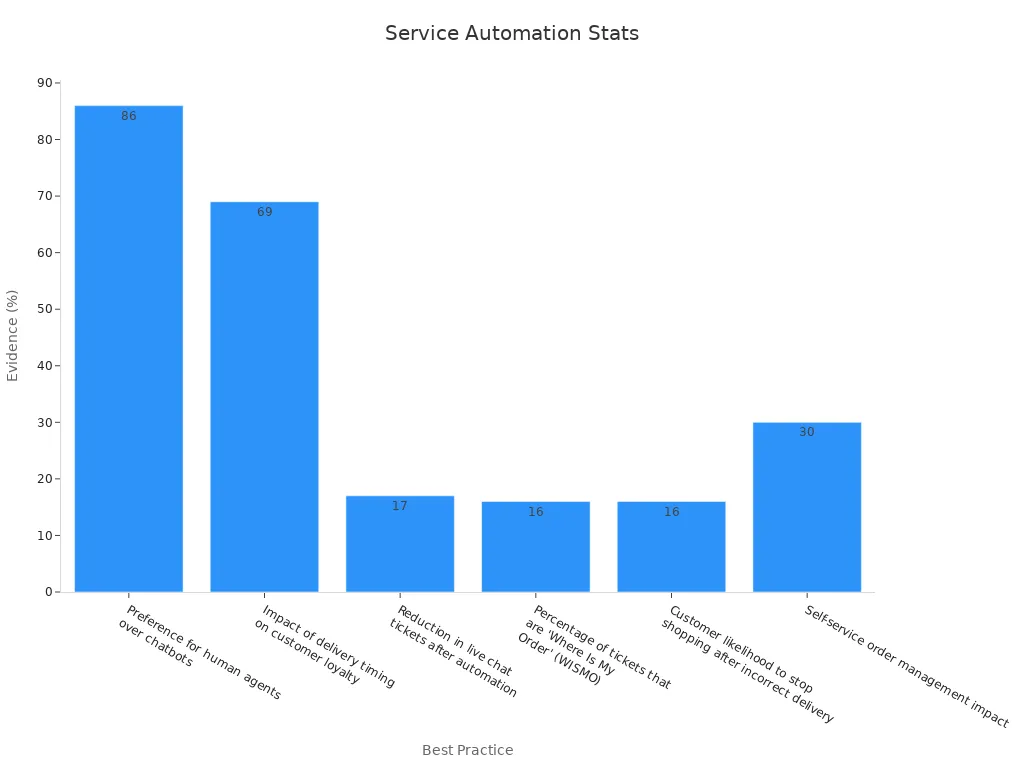
Sobot’s platform supports these best practices with smarter self service, multilingual chatbots, and customer feedback automation. These tools help businesses deliver fast, accurate, and personalized support.
Common Pitfalls
Many companies face challenges when implementing contact center automation. Over-automation can remove the personal touch, which breaks trust if bots fail to understand complex issues. Poor training data often leads to incorrect automated responses. Lack of integration with CRM or ticketing systems causes inefficiencies. Rushing to launch without enough testing, skipping agent training, or ignoring customer feedback after rollout can all lead to problems.
- Over-automation reduces empathy and frustrates customers.
- Outdated or inconsistent help documentation creates errors in responses.
- Missing integration with existing tools leads to operational silos.
- Launching too quickly without testing increases the risk of mistakes.
- Skipping agent training lowers adoption and effectiveness.
- Ignoring feedback prevents continuous improvement.
Companies should use Sobot’s robust integration features and self-service options to avoid these pitfalls. Regular updates and customer feedback automation help maintain high service quality and customer trust.
Automated customer service in 2025 delivers measurable benefits:
- First Contact Resolution rates reach as high as 95%, driving customer satisfaction and operational efficiency.
- 90% of consumers value immediate responses from agents or virtual agents.
- Over 80% of enterprises now use automation, enabling scalable support and freeing employees for complex tasks.
Sobot’s AI-powered solutions help businesses align with customer service trends, combining speed with a human touch. Companies that embrace this balance will lead the next wave of customer experience innovation.
FAQ
What is automated customer service?
Automated customer service uses technology, such as AI chatbots, to handle customer inquiries without human agents. Companies like Sobot provide these solutions to answer questions 24/7, reduce wait times, and improve satisfaction. Over 80% of enterprises now use customer service automation for faster support.
How does customer service automation improve efficiency?
Customer service automation speeds up responses by routing tickets and answering common questions instantly. Sobot’s AI chatbot manages up to 80% of routine queries, allowing agents to focus on complex issues. This approach increases productivity by 70% and reduces operational costs by up to 50%.
Can automated customer service provide personalized support?
Yes. Automated customer service platforms like Sobot use customer data to tailor responses. The chatbot recognizes preferences and communicates in multiple languages. This personalization builds trust and loyalty. According to Salesforce, 66% of customers expect companies to understand their needs.
Is customer data safe with customer service automation?
Sobot ensures data privacy and compliance with global standards, including GDPR. The platform uses encryption and secure backups. A Cisco study found that 94% of users will not buy if data is not protected, making security a top priority.
What results can businesses expect from Sobot’s automated customer service?
Businesses using Sobot’s customer service automation report an 83% chatbot resolution rate and a 94% positive feedback rate. OPPO, a global brand, saw a 57% increase in repurchase rate after adopting Sobot’s solutions. These results show the real-world impact of automated customer service.
See Also
Ways AI Customer Support Software Enhances Operational Efficiency
How AI Service Agents Are Transforming Customer Support
The Efficient Functioning Of Automated Call Center Systems
